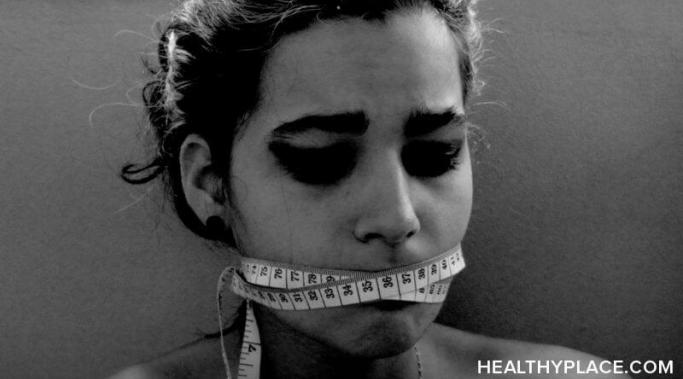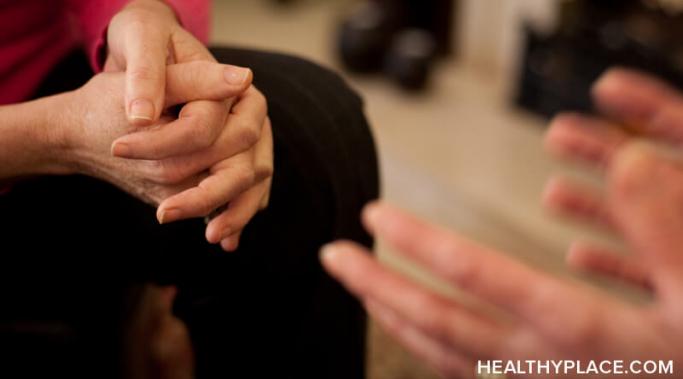Blogs
Really invasive schizophrenic voices stalked me about a week ago. They were brash and loud. They lasted a really long time. And none of my coping strategies worked for calming the impact of the voices. I was at home in my apartment with my husband, too. That should have made the schizophrenic voices episode easier. It didn’t.
Hello, I’m Morgan Meredith, and I’m pleased to join HealthyPlace as a new writer for Living a Blissful Life. I look forward to sharing the approaches and tips I’ve collected over the years to help create a more blissful life in the face of mental health concerns. Though at times I certainly struggle, my goal is to continue developing so that the moments of satisfaction and confidence overwhelm those bliss-killers.
Why can the loss of control cause an eating disorder? When you lose control in certain areas of your life, this can spiral into the "perfect storm" for an eating disorder to emerge. From unhealthy relationships to unstable environments to unforeseen circumstances, feeling out of control is a turbulent emotion that can provoke you to engage in frantic and reckless behaviors. In the effort to regain a sense of equilibrium, it's common to fixate on the one aspect of yourself which seems controllable—your body. But while this coping mechanism provides a fleeting distraction from all the chaos around you, the truth remains that as you plunge deeper into the eating disorder, you're not in control anymore—it's now controlling you.
What can a dual diagnosis of substance abuse and bipolar lead to --homelessness., incarceration or broken relationships. I was a walking dead person for a decade, while my co-occurring mental illnesses were left untreated. After receiving proper treatment for bipolar and and my dual diagnosis substance abuse disorder, I have found a fresh hope.
A good posttraumatic stress disorder (PTSD) trauma therapist can make all the difference when it comes to PTSD treatment, but not all therapists are created equal. Finding a competent trauma therapist for your PTSD recovery can be difficult without an understanding of the technical and interpersonal skills a PTSD trauma therapist should possess, and what approaches you find comfortable.
Sensory overload anxiety can be a real problem for highly sensitive people (HSP). While not all highly sensitive people face intense anxiety, it’s common for highly sensitive people to experience sensory overload anxiety from common, everyday occurrences. But with the right anxiety coping skills, we can better prepare and cope with the challenges of living as a highly sensitive person with anxiety.
Mental health conversations are important at every age and stage of development. As a parent, there’s a lot I want to tell my young daughter about mental health, so hopefully one day she will be a confident woman with a healthy life. She will grow up with me speaking openly about my mental illness as I always have. I hope in return she will feel comfortable talking about mental health as well. I plan on having mental health conversations early and keep the discussion going throughout her childhood. Here are three points I really want to get across.
It's important to reduce work anxiety because it is interfering with the job success and satisfaction of over half of all working Americans.1 Numbers are likely as high in many other countries, too. Performance anxiety, a sense of perfectionism, generalized anxiety, and social anxiety can all hinder our ability to do well at work. Problems at work because of anxiety lead to more anxiety. As anxiety grows bigger, its sheer size blocks us from moving forward and creating a positive work experience for ourselves. It seems like a never-ending cycle, and when work-related anxiety blocks our way forward, it can feel like we’re doomed to be stuck. Fortunately, this isn’t the case at all. You can reduce work anxiety when it gets in your way.
Depression makes it difficult to practice self-love, particularly on the darkest of days. When a seemingly simple activity such as getting out of bed is overwhelming, it is hard to think about practicing self-love; however, by doing small things to show ourselves love, nourishing our minds and bodies can be done.
Life after depression treatment isn't what I thought it would be. I always thought the depression would fade away after my treatments concluded. Electroconvulsive therapy (ECT) had brought me out of a non-functional state. After transitioning to transcranial magnetic stimulation (TMS), I was feeling even better. My medications were finally working. I was no longer numb. I was capable of emotion again. At last, it seemed like the depression was finally gone. But life after depression treatment wasn't all roses.










I believe she will only be able to rid herself of her demons, and hopefully her BPD as well, when she's ready to confront the abuse of her father. If she can put the blame where it belongs, she may stop projecting that victim/perpetrator cycle on the present men in her life. These demons are a metaphor for the purgatory she has created for herself. That reality has consequences in the real world, but it need not be real in the tangible sense. Exorcising her demons will require the expenditure of real physical energy and probably the destruction of aspects of her personality. If this ever happens, and it's possible but not probable, then these demons will evaporate. They are only as real as one's personality is real. In short, reality is not the question, it's what you make of the things you feel to be real.